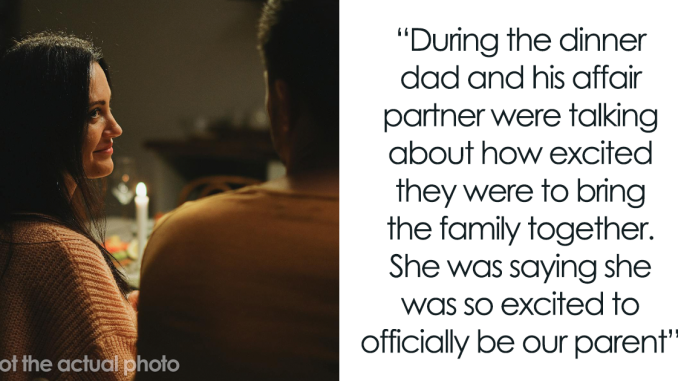
When a couple decides to separate, they often brace themselves emotionally for the challenges ahead. But for children, the experience is different; they may face a mix of confusion, hurt, and anger. This can be especially difficult when a new partner enters the picture.
In one example, a teenager shared the emotional toll of attending her father’s engagement party with the woman he had an affair with during her mother’s terminal illness. Although she and her sister refused to go, their father insisted on making the event their mandatory visitation time. At the party, emotions boiled over, and the sisters openly expressed their hurt, revealing the family’s unresolved issues. Keep reading for the full story and to see how complex family dynamics unfolded in this difficult situation.
Divorce can be especially hard on children, and emotions can run even higher when infidelity is involved
Image credits: Zinkevych_D / Envato (not the actual photo)
A teenager shared how she called out her father’s affair at his engagement party with his new partner
Image credits: Getty Images / Unsplash (not the actual photo)
Image credits: Vitolda Klein / Unsplash (not the actual photo)
Image credits: Anna Shvets / Pexels (not the actual photo)
Image credits: Defiant-Gap2084
The teen also responded to follow-up questions about her visitation rights with her father
Image credits: Elina Fairytale / Pexels (not the actual photo)
Parents are responsible for supporting their children emotionally—before, during, and after a divorce
Marrying the love of your life is a dream that many hold dear. But sometimes, life doesn’t go as planned. Even couples who seemed perfectly in sync can find that, over time, they’ve grown apart. This might lead them to reconsider their future together.
There are times when people fall out of love or find that other challenges, such as differing life goals, priorities, or values, have come between them. Whatever the reason, making the decision to separate can be incredibly difficult.
But when a relationship ends, it’s not just the couple that feels it; the whole family, especially kids, goes through the changes, too. It’s important for parents to sit down and have honest communication with their kids. They should talk to them about the separation in a way that shows they’re still loved.
And the support shouldn’t end after the separation. If a parent starts dating again, they should introduce the new partner to the kids slowly. Each family moves at its own pace, so observing how your children are adjusting after a separation is key.
Taking things slowly allows you to gauge when they might be ready to hear about your new relationship. Give the children all the time they need to feel secure with their routines before adding another change to their lives.
So, when you feel your children are ready, start the conversation with care. Family and divorce expert Ann Gold Buscho, Ph.D., emphasizes that introducing a new relationship thoughtfully can lead to positive, lasting connections. She advises, “When you are successful, you will have years to enjoy your expanded family.”
Image credits: RDNE Stock project / Pexels (not the actual photo)
It’s essential for parents to give their children time to feel comfortable with a new partner
This approach shows that timing, patience, and sincerity can help foster trust and open the door to a warm bond between your children and a new partner. It’s also helpful to be reassuring with your kids. Try explaining that this new person doesn’t change their relationship with you or with the family.
Additionally, when introducing a new partner, it’s important to ask children for their thoughts and feelings. By doing this, parents can help them feel secure and understood, which goes a long way in making the transition smoother.
However, rushing this process can backfire. Kids may end up feeling confused, anxious, or even resentful, especially if they aren’t truly ready to accept someone new. Taking the time to address these feelings and keeping communication open helps everyone adjust and strengthens the family bond.
In cases like the one mentioned, the father’s approach overlooked his children’s emotions. The author must have felt unheard and undervalued, which fueled her outburst at the engagement party. When there’s unresolved hurt, it’s only natural for children to express their frustrations, especially in emotionally charged settings. What’s your take on this situation? Share your thoughts in the comments below.
